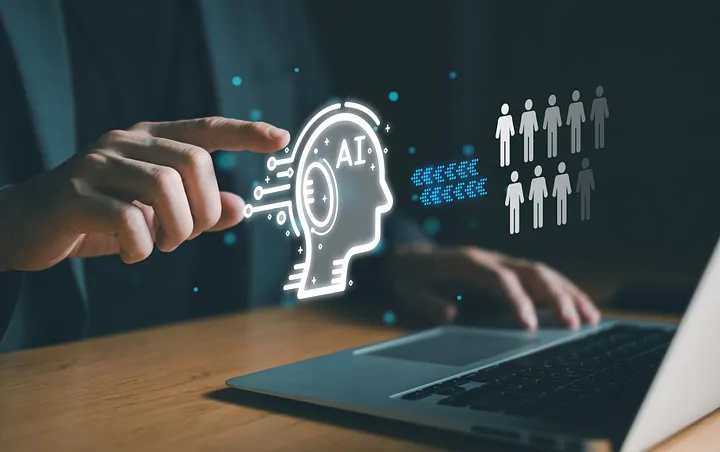Let’s be honest, the conversation around Artificial Intelligence in the workplace is impossible to ignore. From predictive analytics to the voice assistants now baked into our software, AI is fundamentally changing how we work. And with every new development, one question seems to echo louder than the rest: Will AI make my role redundant?
It’s a valid concern. A recent UK government study found that nearly half the population is worried about just that. But I believe we’re asking the wrong question. What we should be asking is: How do we evolve with it?
This isn’t about standing on the edge of a cliff; it’s about stepping onto a new platform. When used wisely, AI is a co-pilot, not a competitor. The people who will truly shape the future of our organisations are those who can master this new relationship between human expertise and machine capability.
AI in the Real World: A Look at the Shifting Landscape
Let’s move past the headlines for a moment and look at the real-world shifts happening on the ground today:
Retail & Supermarkets
Leaders like Tesco are using AI to finesse their delivery networks and pilot “walk-in, walk-out” stores. Is it automation? Of course. But the role of retail staff isn’t vanishing, it’s evolving. The focus is shifting from working the tills to creating genuine human touchpoints, where empathy and a great in-person experience make all the difference.
Healthcare
The NHS, with its 1.4 million-strong workforce, is embracing AI to speed up diagnoses and cut waiting times. And yet, even the most sophisticated algorithm cannot replicate the reassurance of a nurse or the intuitive judgement of a seasoned GP. Here, AI isn’t replacing care; it’s empowering it.
Customer Experience
Yes, bots can now handle routine FAQs in seconds, but they are no match for the nuanced needs of a frustrated customer. AI is freeing us from the repetitive grind. This gives us a golden opportunity to upscale our interpersonal skills and solve the complex problems that machines can’t even begin to anticipate.
Manufacturing
AI is refining production lines with incredible foresight by detecting potential issues before they become problems. However, the artistry behind a Bentley or the impeccable craftsmanship at Rolls-Royce remains fundamentally human. Precision and pride are still intertwined; machines enhance quality, but it’s our people who truly define it.
Financial Services
Digital transformation may have closed thousands of high street branches, but it has simultaneously opened new avenues in fraud detection, complex financial planning, and advisory services. AI can handle the algorithms, certainly. But it’s human advisers who deliver the trust that clients depend on.
Practical Steps for Building an AI-Proof Career
The future belongs to those of us who choose to partner with progress. Here’s how you can make your role more resilient in a world increasingly shaped by AI:
- Treat AI as an Enabler, Not an Enemy
Think of AI as a tool to handle the mundane parts of your job, freeing you up for more strategic or creative work. Whether you’re in operations, marketing or customer service, the key is to adopt tools that complement your skills, not to resist them. - Double Down on Your Human Skills
Machines don’t empathise. They don’t lead with intuition. Your professional edge now lies in areas like communication, emotional intelligence, creative thinking, and team building; these are skills no algorithm can replicate. - Stay Curious and Keep Learning
The most valuable people in any organisation will be those who commit to continuous learning. Take that workshop, sign up for a short course, or put your hand up for a cross-functional project. Adaptability isn’t just a soft skill anymore, it’s essential survival gear. - Map Your Skills to New Opportunities
If your current role is in the direct line of automation, it might be time to look at adjacent roles or even new industries. Don’t think of it as a desperate pivot, but as a strategic repositioning of your core strengths into sectors where human value remains absolutely critical.
Where AI Can’t Compete: The Enduring Power of People
AI is exceptional at pattern recognition, logic and crunching vast amounts of data. But it cannot dream up a new vision. It doesn’t feel genuine empathy. It cannot galvanise a team around a shared purpose. The leaders of tomorrow will be those who harness creativity, empathy and collaboration, the very traits that simply don’t exist in code.
Whether you’re rallying colleagues around a common goal or navigating a sensitive client negotiation, your emotional intelligence will soon carry more weight than ever before.
A Final Thought: It’s a Convergence, Not a Competition
We’re not entering a battle of humans versus machines. We’re shaping a future where both can thrive together. You can think of AI as the engine. But we, the humans, are still the navigators.
So the real question isn’t “Will AI replace me?” but rather “How can I make AI work for me?” Learn to lead it. Use it to elevate your work. Stay curious. Stay human. If you do that, you won’t just survive this era of change; you’ll undoubtedly thrive in it.






